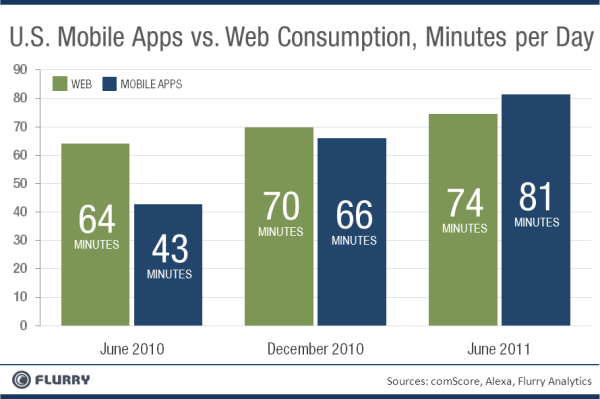Despite the Hype, Native Apps Aren’t Beating the Web
Did you hear? The web is finally, truly dead, for real this time. Here’s the evidence, in black and white, that Americans are now more content to settle down with device-specific apps than with the open web:

Except the chart says nothing of the sort. First, let’s go to the breakdown of what people are actually doing when they’re using apps.

Mobile Gaming Has No Equivalent on the Web
Half the time allotted to apps is eaten up by games. Now, how many of us were spending fully half of our time on the web playing Flash games?
Time spent playing games on a mobile device has no equivalent in terms of web use for the vast majority of users. This use case trades off with other devices and distractions – those quaint consoles and portables from Nintentdo et al., maybe even time spent watching television.
Eliminating games means users are spending 38 minutes a day with web-equivalent apps on their mobile devices, or precisely half the time they spend on the web. That means that despite there being apps for practically everything we do on the web, from social networking to reading news, and a good number of activities that also don’t have equivalents on the web, like location-dependent social networking, we’re still spending more time on the “real” web than with mobile apps.
Most of Those “Native” Apps Are In Fact Web Apps
The longer I report on web versus native apps and the rise of hybrid apps, the more developers I run into who tell me that a huge number of the apps on Apple’s App Store are simply wrappers for what are mostly web apps. This allows developers to re-use code across platforms (say when they want to port to Android) and also makes sense when you consider that many of our most-used apps, including social networking and news, are just as likely to be accessed via the web.
Aside from games, HTML appears to be spreading through both the iOS and Android app stores like some kind of zombie plague, demonstrating, if anything, the power of open standards to make possible the dream of accessing our most current data wherever we are, regardless of the platform we’re using.
So is the web “dead”? Hardly – it’s literally the technology upon which the native app revolution has been built. Facebook’s upcoming experiment in a more purely web-based app store may or may not succeed, but at the very least, it will expose the larger public to this fact.
Keep Reading
Most Popular
Large language models can do jaw-dropping things. But nobody knows exactly why.
And that's a problem. Figuring it out is one of the biggest scientific puzzles of our time and a crucial step towards controlling more powerful future models.
How scientists traced a mysterious covid case back to six toilets
When wastewater surveillance turns into a hunt for a single infected individual, the ethics get tricky.
The problem with plug-in hybrids? Their drivers.
Plug-in hybrids are often sold as a transition to EVs, but new data from Europe shows we’re still underestimating the emissions they produce.
Google DeepMind’s new generative model makes Super Mario–like games from scratch
Genie learns how to control games by watching hours and hours of video. It could help train next-gen robots too.
Stay connected
Get the latest updates from
MIT Technology Review
Discover special offers, top stories, upcoming events, and more.